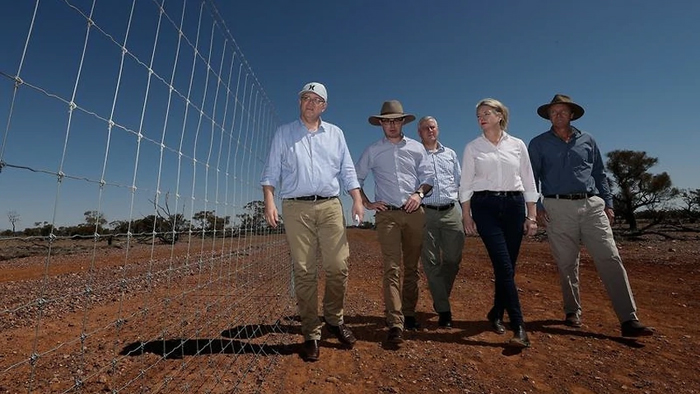Scott Morrison seems to think Australians don’t care about climate change. He couldn’t be more wrong.

Scott Morrison and entourage inspect the damage near Quilpie. PHOTO AAP
It’s hard to know what went through the mind of newly-minted PM Scott Morrison late last month when asked by a reporter whether he thought the current drought was linked to man-made climate change.
Morrison, who has mastered the art of talking through awkward moments, shot back: “The climate is changing. Everybody knows that… I’m not terribly interested in engaging in those sorts of debates at this point.… I understand the arguments… the positions that are held.”
I doubt that. He can have a laugh at people opposed to coal mining – “don’t be scared; it won’t hurt you,” he told parliament last year while holding up a lump of coal – but I can find no evidence that he really grasps why they’re bothered about the black stuff.
Morrison’s choice of Quilpie, in far southwest Queensland, as the venue for his first prime ministerial visit to drought territory was curious. In this near-desert region, rivers rarely flow and green pasture is more the exception than the rule.
That may explain why Stephen Tully, whose sheep and cattle farm he visited, was able to tell reporters that “what’s happened here, so far” fits within his property’s 100-year rainfall record.
The PM could have visited any number of farms east and southeast of Quilpie, across southern Queensland and most of NSW, where some say they can’t remember a worse drought. That fits with climate modelling showing increasing evaporation rates with a warming atmosphere.
The threat from climate change was front and centre on Nauru last week at the annual Pacific Islands Forum, whose final communiqué said climate change was “the single greatest threat” to livelihoods, security and wellbeing in the Pacific.
Australia’s foreign minister Marise Payne signed on to the communiqué, but only after insisting that a stronger message calling on countries to “urgently accelerate” cuts to carbon emissions was deleted. Such a commitment would have drawn attention to her own government’s failings.
Australia does not contest the fact that global emissions remain way above levels for a safe climate future. It claims to be on target to meet its Paris target (at least 26 per cent below 2005 levels by 2030), but there is independent analysis to show it will fall well short.
Malcolm Turnbull’s plan to cement the Paris target in National Energy Guarantee legislation is “dead”, the PM has told the Weekend Australian, leaving a bare climate policy cupboard. That may have been what he promised MPs in the leadership contest, but it will cost him dearly at the polls.
Meanwhile, at a UN climate meeting in Bangkok last week, Australia sided with the US and Japan seeking less stringent rules for reporting financial aid to poorer countries in their shift to low-emission technologies, effectively weakening our Paris obligations.
The thread running through those events in Quilpie, Nauru and Bangkok is that however weak the Turnbull administration’s climate policies were, those under Scott Morrison will be weaker still.
When Morrison has chosen to join this debate it is to play the clown with a lump of coal. He has not explicitly denied human-induced climate change, or withdrawn from Paris or sought to eliminate emission constraints, as has Donald Trump. But we can’t be confident that he wouldn’t.
There’s a prevalent political narrative that blames “toxic” climate policy for leadership changes and electoral shifts in the past decade, implying all climate measures are anathema to the electorate.
This seemed true in 2013, when Tony Abbott won power on the back of a fierce campaign against carbon pricing and the annual Lowy Institute public opinion poll found only 36 per cent of Australians favoured strong, immediate climate action. But it’s definitely false in 2018.
Since 2006, annual Lowy polls have proven to be professional and reliable guides to public policy. This year’s poll showed that 59 per cent of Australians and 70 per cent of adults under 45 see global warming as “serious and pressing” and say we should act now even at significant cost.
It also found that 84 per cent of people – up from 81 per cent last year – want the government to focus on renewable energy and infrastructure to make the system more reliable. Just 14 per cent opted for a focus on coal and gas.
That is a huge majority in favour of renewables, and it has happened despite concerted government efforts to boost fossil fuel energy. It’s a clear win for commonsense.
By contrast, the crazy debate over Liberal leadership assumed that no-one cares about climate change. It has already cost the Coalition dearly, and Scott Morrison’s cavalier attitude to cutting emissions will only make matters worse.
“WHERE TO NOW?” is the question posed at a public forum tonight (starting 5.30, Hobart Town Hall) to discuss climate policy, action and ideas. Speakers include eminent climate scientist John Church, climate policy expert Evan Franklin and conservationist Bethany Koch.
